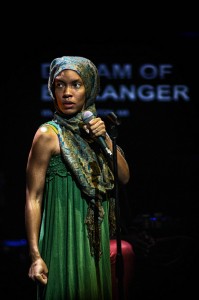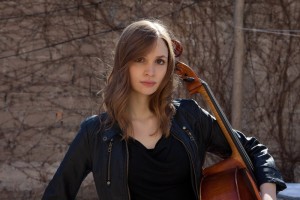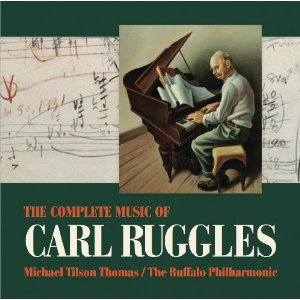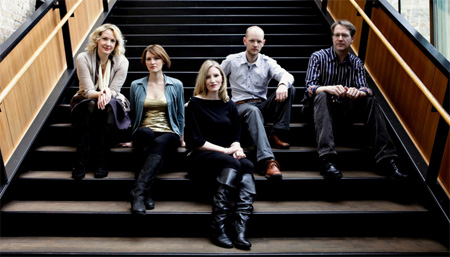
Photo by Marc Millman Photography
The most recent collaboration of composer/pianist Vijay Iyer and poet Mike Ladd, entitled Holding It Down: The Veterans’ Dreams Project, received its world premiere last week (September 19-22) at The Harlem Stage Gatehouse. This multimedia work, epic in scope, yet poignant in its emotional nuance, is the result of three years of interviewing and collaborating with veterans of color from the recent wars in Iraq and Afghanistan. Holding It Down also marks the culmination of a trilogy of multimedia works by Iyer and Ladd, the others being Still Life with Commentator (2006) and In What Language (2003). Each of the three works examines a different aspect of post-9/11 America, but all three respond to the fear and injustice brought on by what Iyer and Ladd eloquently describe as the “insidiously racialized Global War on Terror.”
Iyer’s through-composed score consisted mostly of highly sensitive and imaginative settings of the poetry of Ladd and two veterans, Maurice Decaul and Lynn Hill, punctuated by moments of virtuosic improvisation by Iyer and members of the ensemble. The poems (performed by their authors) were moving, powerfully honest artistic responses to war and the challenges of coping with trauma. Tim Brown’s video design contributed an evocative visual counterpoint, and the video interviews, conducted and edited by the project’s director, Patricia McGregor, were particularly well timed and interesting. The ensemble, which consisted of Iyer (piano, laptop), Guillermo E. Brown (vocals, electronics), Liberty Ellman (guitar), Okkyung Lee (cello), and Kassa Overall (percussion), provided an intricate, colorful, and at times surreal musical mindscape. One unforgettable moment was Overall’s gut-wrenchingly beautiful drum solo about two thirds of the way through the piece.
The presentation of a continuous 80-minute piece that brings combines music, poetry, video, and drama is no easy task. Careful attention must be given to the balance and interplay of the various media, and the dramatic flow and experiential continuity. Credit must be given to director Patricia McGregor, who forged the elements of this work into a seamless and deeply moving journey. With the exception of two moments when the balance between the ensemble and voices could have been handled better, the production was basically flawless.
With Holding It Down Vijay Iyer and Mike Ladd have offered a model of how artists can present social commentary that is profound yet unsentimental; complex yet focused; provocative yet inviting. While so many multimedia projects these days hurt the genre by dilluting their own impact, Iyer and Ladd have created one in which each medium strengthens the whole. On December 1, 2012, these artists will appear again at The Harlem Stage Gatehouse for a new piece called Sleep Song, in which they will focus on the populace of nations affected by war. Collaborating artists for Sleep Song will include the Iraqi poet Ahmed Abdel Hussein, oudist Ahmet Mukhtar, and guitarist Serge Teyssot Gay.






 My advice to any aspiring string quartet player, or chamber musician is to strive to be the strongest instrumentalist you can be. You should be able to play concerti, sonatas, solo Bach….you name it. If you have those skills at your fingertips, as it were, you can offer that back to your ensemble, which only strengthens the whole. An ensemble is only as strong as its weakest link.
My advice to any aspiring string quartet player, or chamber musician is to strive to be the strongest instrumentalist you can be. You should be able to play concerti, sonatas, solo Bach….you name it. If you have those skills at your fingertips, as it were, you can offer that back to your ensemble, which only strengthens the whole. An ensemble is only as strong as its weakest link.